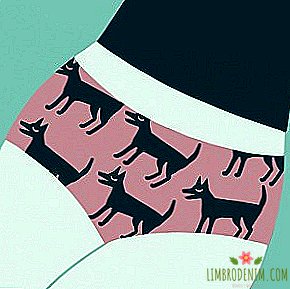Deputy GQ editor-in-chief Elena Smolina about favorite books
IN BACKGROUND "BOOK SHELF" we ask journalists, writers, scholars, curators, and other heroines about their literary preferences and publications, which occupy an important place in their bookcase. Today, the deputy editor-in-chief of GQ and film critic Elena Smolina shares her stories about favorite books.

Houses have always read, partly due to the fact that parents are somehow connected with literature: father is a satirist writer, mother is an editor. So perhaps I had no choice. My mother taught me to read (and, in principle, she still reads more than anyone in the family, that is, literally constantly with a book), almost unmistakably giving me something that you will definitely like: thanks to her, my favorite childhood poet is Edward Lear forever, then there was a wonderful Nikolay Nosov, Jerome Klapka Jerome, O. Henry, Mark Twain, Lewis Carroll, Ernest Seton-Thompson, Gerald Darrell.
Dad rarely advised something, but his recommendations were always pin-point, he was very personal and unconventional about books, never repeats other people's assessments. My dad and I read together Arkady Gaidar, whom I adore so far, and if you think which literary heroes are closest to me, then the Gaidar’s Malchish-Kibalchish’s will definitely get into the top three (probably, Franny Glass and Andrei Bolkonsky will be there - all lovers pozamorachatsya).
Already later, in adolescence, with the Pope we discussed Hemingway, and Marquez, and Shukshin, and even Francoise Sagan. Her book "Hello, sadness!" surprisingly, it was my father who slipped me as an illustration: you can be a seventeen-year-old girl without some special life experience (such as a service in a hot spot, or work at a factory, or a prison term) and successfully engage in literature.
I definitely understood one thing about my relationship with books: I cannot stand artificially built hierarchies imposed by anyone on the high and low divisions. It seems to me that there is nothing but blindness and self-restraint. I will not be ashamed of the love of Tolstoy, because it is banal, or of the love of Bulgakov, because it has become fashionable not to love. For me, books, as well as art, and cinema, are always about contact first of all: does something respond to you when you meet this work? What exactly does it make you feel? What to think about? Why? It doesn’t matter if the artist is “complicated” in front of you or “simple”: to be afraid of some is just as stupid as snooping others. A hit can happen both while reading, according to popular opinion, the complex Faulkner, and the popular Le Carré. Why limit yourself?
The most intensive in terms of reading time I had the last class of school and the first courses of VGIK: I studied in film studies. I did not go to school in the eleventh grade, I was preparing to enter home schooling, and the rest of the time I was absorbed by the vacuum cleaner Nabokov, Hemingway, Marquez, Amadou, Shakespeare — rather chaotically. Well, in VGIK, I had to read more systematically: both ancient literature, medieval literature, and Renaissance - in order. At the same time she began to read the special literature about the cinema, and now about half of my books are anyway professional literature. Now, of course, I envy both the memory and receptivity of twenty-year-olds: now I read much less, and I remember exactly half of what I read.
I like conditional division very much: Tolstoy’s man or Dostoevsky’s man. The point is, recognizing the genius of both, to determine whose universe is closer to you personally. In my experience, it is always either-or, and the most fun is to guess about friends. Of course, I am a man of Tolstoy. Dostoevsky is too painful for me, all this is stuffy for me, and dark and hard. And in the books of Tolstoy I could live, and their reflection, and emotionality, and philosophy, and cordiality — everything seems to be consonant and intimate. Recently, by the way, in one of the interviews I asked this question to the director of the new "Star Wars" JJ Abrams, who already jumped up with delight: "Tolstoy! I'm very much a Tolstoy person!" So this thing also works regardless of language or mentality.
I have a complicated relationship with e-books, or rather no relationship: I read on paper. I drive books from trips, because I try to read the English-language version in the original, I fill it with a suitcase. Probably, one should already learn to read electronic ones, but it is psychologically difficult for me when the number of remaining pages does not decrease (by touch): I’m not talking about the process, but about the result. Also, apparently, self-revealing confession, and after this I won’t be taken to public intellectuals. Well, God be with him.

Richard Yeats
"Road of Change"
The story of Richard Yeats is another example of how sadly a creative writer’s fate can be. Although Yeats's first novel, The Road to Change, was successful and gave him the status of one of the most important American authors, his books were subsequently sold poorly, and Yeats became more of a writer for writers and critics. The general public for the next half century did not know his name, Yeats was in poverty, he was sick, he missed - and all this time he wrote wonderful, sad books. I discovered this novel for myself after Sam Mendes’s movie of the same name, and then I read all the books of Yeats I could find. They are amazingly good. Everything. And the "Easter Parade", and "Breath of Fate", and collections of short stories. Any book that says "Richard Yeats" can be bought and read - this is subtle, piercing, and very, very sad prose.
Federico Fellini, Tonino Guerra
"Amarcord. And the ship sails"
Tonino Guerra is a classic, permanent screenwriter Fellini, who worked, besides him, with many other big directors, a writer, a poet, an artist and, in general, a Renaissance man. I was somehow lucky to be at his master class at VGIK - I regret that I did not write down every word: there will no longer be such as Guerra. This book is two movie stories written in a magical language, they are very different from how scripts are now written. Now there are so many technical details and information in the scenarios that the director, producers, operator and artists need, that the text itself is often not visible. Guerra's film stories are read as literature - this is also what the scriptwriters of the Soviet school write, for example, Alexander Mindadze. When Guerra was asked, whose childhood is more in "Amarcord" - him or Fellini, he said: "Guerra is what is written on paper. But what is filmed on film is already Fellini!" So this book is a personal story for both.
William Goldman
"Adventures in the Screen Trade"
In response to the question of the questionnaire Prusta "What quality do you value most in a man?" David Bowie said: "The ability to return books." I usually fully share this thought and ardently propagandize, but this book has been played on by my boss and friend Kim Belov. At some point, I took it from Kim to read, but I realized that I probably would not be able to give it away. Kim eventually had to give it to me. The author is a screenwriter who worked most actively in my favorite period in American cinema - in the 70s. Goldman, for example, is the screenwriter for the film "Butch Cassidy and the Sundance Kid" with Robert Redford and Paul Newman.
This is a witty and coolly written book, very informative for everyone who is going to work in the cinema or is simply interested in this field. Of course, there are a lot of jokes about Hollywood in the 70s, and among the permanent characters are Robert Redford, Steve McQueen, Dustin Hoffman, Laurence Olivier (“Marathoner” also wrote Goldman), Paul Newman. Even in this book there is an important phrase "Nobody knows anything", which applies to both producer predictions regarding the script, and any predictions of success (or failure) of the film. Her after the publication of the book is widely cited filmmakers. No one knows for sure, and it calms a little.
Francis Scott Fitzgerald
"The Last Tycoon"
Fitzgerald's latest novel, published after his death. This is a book about Hollywood, and her main character, Monroe Starr, runs a large film studio. Starr’s prototype was produced by Irving Talberg, after whom the honorary award of the American Film Academy was named. He was a child prodigy of the American film business, ran MGM studio at an indecently young age, was married to the beautiful star Norma Shearer, and died very early (Talberg had a bad heart since childhood, doctors believed he would not live to thirty). It is believed that this unfinished novel - the best of Fitzgerald. I don’t like to put books and films into best / worst charts, but this novel is really very discreet and subtle, besides there are autobiographical moments in the book: Fitzgerald worked as a writer in Hollywood for a while, however, the experience was for him not too successful and joyful.
Jennifer egan
"Time is the last to laugh"
This book was given to me by Mikhail Idov when we worked together in GQ. Egan - one of the most interesting American writers today, the book won the Pulitzer Prize. This story, which in an ideal world should be filmed "Vinyl". The rights to it, by the way, were purchased by HBO, but, as far as I know, it has not yet been filmed. Egan here is very free to deal with the circumstances of the place and time, switching between different storylines, but mostly we are talking about the San Francisco punk scene of the 70's and 80's, most of the characters are connected with the music industry (and among themselves). This is a piercing, very intricately composed book about time, past and, in general, lost forever.
Ian McEwan
"On Chesil Beach"
A person who always comes to my rescue when I want to read something. At McEwen about once every two years (for some reason it seems that more often) a novel comes out, which I like. The most famous, perhaps, of his books are The Atonement and Amsterdam, and of the latter I still like Sweetheart: a student of the Cambridge Faculty of Mathematics, who turns out to be recruited by her professor in MI5, is an excellent retro about espionage and literature. For this list, I chose "On Chesil Beach" ("Ashore"). This is a very sad and delicate story about the fragility of human relationships: how one moment can undo a whole fate. Dense, poetic prose. The last sentence - some absolutely perfect one - at some point I learned by heart.
Matt zoller seitz
"The Wes Anderson Collection"
Wes Anderson is a hipster god, but I love him for something else. I like artists with a vision: even when they get something worse than usual, it’s still their own language, a special manner that you can’t confuse with anyone else. Anderson like that. In his puppet, plush-yellow-orange universe live brothers Wilson, Angelica Houston, Bill Murray, foxes, Gwyneth Paltrow in a fur coat - what more do you want? My friend gave me a birthday book. Here you can see how attentive Anderson is to the details, how difficult each frame is for him and why his films are a piece of work.
Sergey Dovlatov
"Craft"
A book about how a lyrical hero became a writer. Dovlatov is not only witty and subtle, he is more complicated than it seems: for example, in his books, with the seeming simplicity of form, in one sentence there are no words starting with one letter. Often, Dovlatov's prose is perceived as exclusively autobiographical, although this is not so: his books are a complex mixture of fiction, strongly embellished reality, and real writing.
Ray Bradbury
"Martian Chronicles"
I fell in love with science fiction as a teenager. In principle, a good way to quarrel with me is to call a science fiction low genre. Because what was done by Ray Bradbury, Clifford Symak, Robert Sheckley, of course, is called great literature. It just so happened that robots and aliens come across among the actors. In this book, in addition to "Martian Chronicles" (which are the essence of the novel, consisting of short stories) there are also stories, including two of my favorites: "And yet our ..." and "Kaleidoscope". In the latter, after the explosion, the rockets, the astronauts doomed to death fly in different directions and, while there is still a connection, are talking to each other. When a couple of years ago I began to watch "Gravity" by Alfonso Cuarona, I immediately remembered this story. As a result, it turned out that the film was inspired by Kaleidoscope. In general, almost any good fiction, going to other worlds, actually tells about the nature of man.
Michael Bulgakov
"Theatrical Novel (Notes of the Dead)"
It is interesting, of course, that in this collection several unfinished books and books about writers or screenwriters are at once frustrated. I will not, perhaps, analyze this fact. Bulgakov’s unfinished novel reflects his experience at the Moscow Art Theater, the conflict with Konstantin Stanislavsky and his relationship with the legendary troupe of the Moscow Art Theater. The work on the play "Black Snow" in the novel is the experience of Bulgakov, the playwright, who wrote for the Moscow Art Theater "Days of the Turbins" and "The Cabal of the Holy."
The book is simultaneously sarcastic, ridiculous, almost exposing to the famous “system” and sad: after all, its main character is a playwright, and, as we have already found out, scriptwriters and playwrights are cruelly tortured at all times. Bulgakov read chapters from the novel to his friends from the theater, including his stars (all of them were derived in the novel), and, according to the memoirs of the writer's wife Elena Sergeevna Bulgakova, the Mkhatovs were very happy. What is never surprising: in my opinion, this is one of the funniest Russian-language books.
Anjelica huston
"Watch Me"
Memoirs of a Hollywood actress and a woman who managed the impossible - she lived with Jack Nicholson for 17 years. The most interesting in this book - the actual chapter on Hollywood 70s and life with Nicholson. There is, among other things, a version of the episode that crossed Roman Polanski’s American career (Angelica Houston was inappropriate to return home when the director was already finishing a photo session with a 13-year-old model who later accused Polanski of rape).
Houston is very smart, confident, sarcastic and writes well. As the daughter of a great Hollywood director John Houston, Angelica started out as an actress and model, but she looked unusual, and she was often advised at the beginning of her career to do something else. Actually hence the name of the book. One day, a well-known film director told her in a friendly way that she would not succeed in the cinema. Watch me, Houston thought then. Aloud, of course, she politely agreed.




